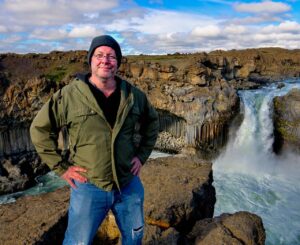Steven Hartman is Visiting Professor in the Faculty of History and Philosophy at University of Iceland. He leads the Circumpolar Observatory group in the Humanities for the Environment (HfE) global observatory network and from 2021 is Executive Director of the BRIDGES Sustainability Science Coalition in UNESCO’s Management of Social Transformations Programme (MOST).
Hartman’s academic specialties are diverse, including literary reception studies, cultural and environmental history, literary translation, science communication, creative writing and integrated environmental humanities. His work addresses environmental memory, integration of the humanities in global change research, and collaboration among social and human scientists, artists, education specialists and civil society in efforts to meet sustainability challenges of the present and foreseeable future. Transdisciplinary approaches to convergent knowledge production–aimed at engaging diverse communities of interest, knowledge and practice, both within and outside academia–unify many of these projects. Also unifying this body of work is an underlying ambition to better understand and articulate how co-productive processes of learning, research and societal action, promoting responsible environmental change and wise practices of stewardship, both feed into and derive amplified strength from new communities of purpose, as agents of sustainable social-ecological transformation.
Steven Hartman has led/co-led numerous projects funded by the Swedish Research Council, The Swedish Foundation for Humanities and Social Sciences and NordForsk (the joint research foundation of the Nordic Council of Ministers). For more than a decade he coordinated the Nordic Network for Interdisciplinary Environmental Studies (NIES). Recent international projects led/co-led include Bifrost and the transdisciplinary research investigation Reflections of Change: The Natural World in Literary and Historical Sources from Iceland ca. AD 800 to 1800 (ICECHANGE). He currently participates in international projects funded by the U.S. National Science Foundation, the Belmont Forum and the EEA and Norway fund. He is a member of the Scientific Steering committee of the Integrated History and Future of People on Earth (IHOPE) and serves as co-chair of the advisory board of the Human Ecodynamics Research Center (CUNY Graduate Center, City University of New York).
